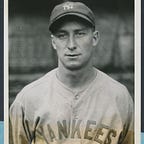Wednesday, May 11, 1927: Chicago
Andrew Rube Foster and the Ride to Kankakee
 Before Benny Morton first told me stories about A.R. Foster last season, I didn’t know much about the man.
Before Benny Morton first told me stories about A.R. Foster last season, I didn’t know much about the man.
Morton is in Chicago for a couple of weeks and he’s been sitting in with Louis Armstrong’s band, so the last two nights Benny Bengough and I went to see him play. Also sitting in was Jimmy Yancey, a great colored pianist. Bengough and I know Yancey enough to say hello, because he’s a member of the White Sox grounds crew at Comiskey Park.
Because Armstrong and the members of his band are such crazy baseball fans, both nights between sets, drinks, and Pops’s Mary Jane cigarettes, we talked a lot of baseball — and a lot of our conversation was about A.R. Foster.
I knew Foster was the commissioner of the first Negro League, and by far the most important person in black baseball, but I didn’t know his full story. After listening to Armstrong, Yancey and Morton — and talking about Foster with the Babe and Miller Huggins — it’s clear to me that A.R. Foster must have been one of the most amazing men ever, colored or white, in or out of baseball.
Jimmy Yancey’s known Foster the longest, and according to him, “Rube Foster was a man when he was 17 years old.” That’s when Foster left home for good, just before the turn of the century, carrying a baseball bat on his shoulder and a pair of Texas six-guns around his waist. “He was tough and already 200 pounds,” says Yancey. “That was about 50 pounds less than he would be once he started managing his team, and about a hundred pounds less than he would be when he started running his Negro League.”
 Foster started playing for baseball teams in Texas, then he moved North and by the early 1900s he was the best colored pitcher of his time. The Babe, who used to be one of the three best pitchers in baseball, told me that Honus Wagner says Foster was right up there with Walter Johnson for throwing the ball, and that Wagner says Foster was the smartest pitcher he ever saw.
Foster started playing for baseball teams in Texas, then he moved North and by the early 1900s he was the best colored pitcher of his time. The Babe, who used to be one of the three best pitchers in baseball, told me that Honus Wagner says Foster was right up there with Walter Johnson for throwing the ball, and that Wagner says Foster was the smartest pitcher he ever saw.
The Babe says Foster taught the great Christy Mathewson how to throw his remarkable fadeaway pitch — and he got the nickname “Rube” after he out-pitched Rube Waddell and beat the Philadelphia Athletics in an exhibition game when he was just 23.
Foster played for a lot of the top Negro teams — the Philadelphia Cuban X-Giants, the Chicago Leland Giants and the Chicago American Giants — and when he wasn’t pitching, he played first base. Almost everybody who saw him says he was the equal of any ballplayer but Ruth.
Around the time he turned 30, Foster started a new ball club, the Chicago American Giants, and was their player-manager. They were Negro baseball’s best team and biggest draw wherever they played. Then Foster made a 50/50 partnership with a white saloonkeeper, John Schorling — the son-in-law of Charles Comiskey, the White Sox owner — who controlled the ChiSox old field, South Side Park. In exchange for giving Schorling a 50 percent stake in his ball club, Foster’s got his team a permanent home.
On weekends they filled the old ballpark up. They got so popular, plenty of days they had more fans in their stands than either Comiskey’s White Sox or the Cubs had in their ball parks.
As a manager, Foster was as smart as John McGraw. In fact, McGraw used to come to Chicago to watch the American Giants play and he would also watch Foster training his team. Foster had a number of really innovative drills. “To play for Rube Foster you had to be able to bunt into a hat,” says Pops.
“What’s that mean?”
“Ofay, it means bunt into a hat. Rube would put two hats out on the field, one between the pitcher’s mound and first base, the other between the mound and third. If you couldn’t get a bunt down into one of those two hats, you couldn’t make the team.”
John McGraw really admired Foster’s baseball mind — and there aren’t a lot of minds the Little Napoleon admires, at least not in baseball. It must have been a sight to see the two greatest baseball managers, one black and one white, talking about strategy and drills and what managers call “inside baseball.”
McGraw also admired Foster’s ballplayers. Foster told Yancey that during one practice, McGraw wrote down in his notebook the names of nine of Foster’s American Giants players, who McGraw said would have made his New York Giants squad, if they’d been white.
After the Chicago riots in 1919, when all those coloreds were killed and their neighborhoods torched, Foster wasn’t scared off, just the opposite. He decided to deepen his roots in Chicago. Instead of just booking his own team’s games one at a time, he started a league of Negro teams — tying together the best squads in Chicago, Kansas City, Cincinnati, Indianapolis, Cleveland, Detroit and Pittsburgh — and anchored it in the Windy City. He still played and managed, but after the Negro League started A.R. Foster ran it.
Benny Morton says that Foster didn’t take a salary for running the league. Instead, he took 10 percent, sometimes more, of all the gate receipts. He lived loudly, but he also used his money to keep the teams afloat — and he paid his players well.
Jimmy Yancey told us, “Rube was so powerful running that league, shit, sometimes he would tell the other teams when they should pitch their best pitchers. He’d say, ‘Don’t start your best pitcher on a Friday, pitch him on Sunday. That way more fans will see him, and your team will become more popular.’”
 Even when he was spending most of his time running the entire league, Foster’s teams won the pennant in 1920, ’21 and ’22. I saw them play. They were terrific, smart teams. They played a crazy combination of dead ball and home run baseball. Unlike McGraw, who hates home run ball and still only wants to play “inside baseball” — even in this age of Ruth — Foster loved big hitters. But he also managed an aggressive base stealing, hit-and-run style of game.
Even when he was spending most of his time running the entire league, Foster’s teams won the pennant in 1920, ’21 and ’22. I saw them play. They were terrific, smart teams. They played a crazy combination of dead ball and home run baseball. Unlike McGraw, who hates home run ball and still only wants to play “inside baseball” — even in this age of Ruth — Foster loved big hitters. But he also managed an aggressive base stealing, hit-and-run style of game.
Just think about it:
Rube Foster was as valuable a player as any man but Babe Ruth. He was as smart a manager as any man, even John McGraw. And he had as much control over his league as Judge Landis does over Major League Baseball.
But then something happened.
A couple of years ago, Foster almost died from a gas leak. Maybe the gas did something to his brain, or maybe something else did it, but he started getting paranoid and sometimes violent. He had always kept his six-shooters nearby — the ones he put on when he left his childhood home in Texas — but now he wore them out everywhere. He also started seeing things and having strange conversations: “Sometimes he’d be walking down the street,” says Yancey, “and he’d just stop and tell people — complete strangers — he was walking to Comiskey Park to pitch in the World Series.
“He did this when it was snowing outside.”
Finally it got so bad that last year his family committed him to the state asylum in Kankakee, Illinois, about 60 miles south of Chicago.
His family doesn’t have any money because Comiskey’s son-in-law, Schorling, went back on his word. His deal with Foster was done on a handshake, and as seems to happen when white and black hands shake on deals, the black hand was left holding nothing but air. Foster’s 50 percent partnership evaporated, and now the family’s run out of money.
Jimmy Yancey told us he tries to go down to the asylum in Kankakee every other week or so, just to make sure that Foster is being properly cared for by the institution, and that he was leaving early Thursday morning.
Benny Morton asked if he could go with him, and Jimmy said yes. I don’t exactly know why, but I asked if I could go along. Jimmy was sort of shocked at my asking. He looked at Pops to see if he also thought it was queer, but Pops just gave Jimmy a real slight nod of his head. It was the sort of nod musicians give each other when they’re handing off a lead, and this time it told him that Pops thought I was an alright guy. And so at six o’clock yesterday morning, I met Jimmy and Benny Morton behind the Cooper-Carlton Hotel where the Yankees stay here in Chicago, and we drove south, to Kankakee.
On the way down Jimmy and Benny were chirping nonstop about baseball and jazz — a lot about Pops — and about gangsters and broads. Benny even took out his trombone and played while Jimmy drove. We got to Kankakee a little before 8:30 a.m.
It was a cloudy morning, at times it looked like it would rain, but the weather held up on the way down. Still, even if there hadn’t been a cloud in the sky, it would have been a gray day. The asylum in Kankakee blocks out the sun. It’s as big as any hospital or prison I’ve ever seen.
Jimmy drove our car to the colored section of the hospital, and parked it under a tree. He spoke with a nurse, who signed the three of us in as visitors and gave him a key with a room number attached to it. Jimmy led us up a flight of stairs and down a labyrinth of green and white and gray hallways. Finally we stopped at a door with a thick glass window with chicken wire running through it, so it couldn’t be broken. There alone in his room, lying on his side in his bed, facing away from us toward his window was A.R. Foster.
He was lying on top of his sheets and blanket, wearing a large hospital gown. There was hardly anything in his room. Jimmy told us that was because the hospital couldn’t watch him all the time and they couldn’t leave anything he might use to hurt himself. Jimmy quietly unlocked the door with the key that the nurse had given him, and he and Morton walked into the room. Jimmy softly said, “Good morning, Mr. Foster.”
Foster didn’t seem to hear him. So after a few seconds, Jimmy again said, with a voice that was quiet and full of respect, “Good morning, Mr. Foster. It’s me, Jimmy Yancey.” He paused a second and said, “I brought a friend of mine, Mr. Foster, his name is Benny Morton. He used to play baseball in New York. Now he’s a musician, too. He saw you play when he was just a kid. He wanted to come and meet you today, sir.”
There were two windows in the room, and they were constructed so they couldn’t be opened from the bottom. They could only be opened from way up top where you couldn’t reach, certainly where Foster couldn’t reach them, and they could only be opened about six inches, even in the summer. Just enough so we could hear the morning birds. Other than that it was silent.
Jimmy and Benny walked to the foot of the bed, and Morton started to put out his hand, even though he knew he couldn’t physically reach him, and said, “A pleasure to meet you, Mr. Foster.” Foster looked up and then slowly, as if he had a clock inside his head that moved one second for every minute of ours, slowly nodded his head. He started to roll over, to roll away from the window — and that’s when he noticed me.
“Good morning, Mr. Foster,” I said.
Foster squinted to try and bring me into focus. On his own time he sat up in bed, and as he did his legs slipped to the floor. He took a while to steady himself and then he stood up and walked slowly across the room to me.
“Mr. Comiskey,” he said. “I’m so appreciative to see you again, this morning.” Both of his enormous, powerful but soft hands swallowed my pitching hand as he shook it. “Mr. Comiskey, I want to make a proposition to you, sir. Your team and the Cubs have been playing the Chicago City Series almost every year since 1903 — that’s over 20 years — and you draw a lot of people to your games. Well, I believe that if you would consider allowing my champion American Giants to play the winner of your City Series, we could sell out Comiskey Park for as many games as we played.”
I looked over at Jimmy. He nodded the same musician’s nod that Pops had given him about me, the night before. But nothing came out of my mouth. Foster then went on.
“Mr. Comiskey, I would be willing to give you 66 percent of my gate, that’s more than triple what you would normally get from a home team. And I give you my word that I won’t pay any of my players as much as you pay yours to play in the series.”
He leaned forward to take me into his confidence. “You do this, Mr. Comiskey, and you’ll find you have a lot more fans next year during the season. You know, we’ve been selling out your old ballpark on weekends. There are lots of baseball fans here in Chicago, and they can’t get enough of any of our baseball teams.” Then he got quiet.
“You don’t want more fans? Yes, I understand, you don’t want more fans, if they’re going to be colored fans.” He got quiet again.
“I understand that, Mr. Comiskey. But our colored fans are real baseball fans, real good baseball fans, and they’ll pay real good money to watch your boys play white baseball.” He was looking right into my eyes. He was trying to figure out what I — what Mr. Comiskey — was thinking. He was trying to figure out if there was any way that he could change my mind. But he couldn’t.
“Well, thank you, Mr. Comiskey. Thank you, sir, for seeing me. I hope you’ll think some more about this, and we can talk again.”
He let my hand go, but I didn’t move it. It just stayed there, as if it were now being held up by the silent echo of Foster’s request. And then Foster turned and walked back to his bed. He sat down, and then he slumped back onto his side and rolled back onto his pillow, once again facing the window, covered only by the gray light entering his hospital room.
After no more than 30 seconds, Jimmy said, “He’s asleep.”
The three of us stayed for about an hour, with Jimmy sitting at the end of the bed, closely watching him. But A.R. Foster never opened his eyes. Around 10 o’clock we left him alone in his room. After Jimmy locked the door he just stood, silently watching Foster through the thick glass panel with the chicken wire. Jimmy never moved. He never made a sound. But he was crying.
The ride back to Chicago was much quieter than the ride out to Kankakee.
- 1927 Yankees
- LOUIS ‘POPS’ Armstrong
- Charles Comiskey
- ANDREW ‘RUBE’ Foster
- Walter Johnson
- Commissioner Landis
- Christy Mathewson
- John McGraw
- BENNY Morton
- Rude Waddell
- Honus Wagner
- Jimmy Yancey
“Reading and Writing Ruth’s Mail”
I’m sitting at my locker, stewing a bit — wondering why Huggins hasn’t put me in any games in over a week since my successful, belated season debut against the Senators back on May 4th — when a naked Babe with a cigar butt in his mouth comes over and asks, “Hey, Duck Eye, you speak any foreign languages?”
